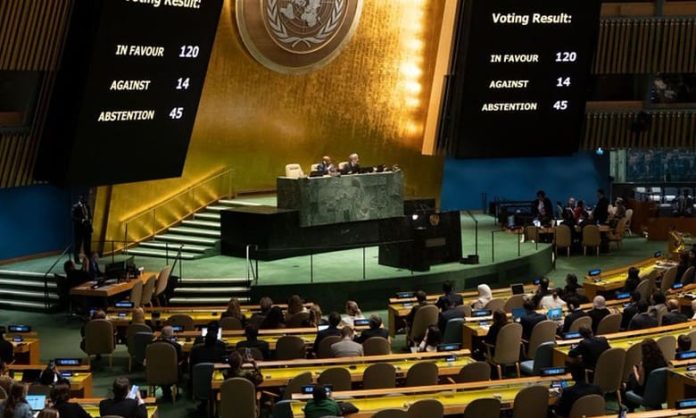United Nations: In a significant diplomatic move, the United Nations General Assembly (UNGA) adopted a resolution on Thursday demanding an immediate, unconditional, and permanent ceasefire in Gaza, along with unrestricted humanitarian access across the besieged territory, reported the UN News.
During its resumed 10th Emergency Special Session on “illegal Israeli actions in the occupied Palestinian territory,” the resolution was passed with overwhelming support — 149 countries voted in favor, while 12 voted against and 19 abstained.
The resolution strongly condemns the use of starvation as a method of warfare and the unlawful denial of humanitarian access, highlighting the legal obligation under international law to ensure civilians are not deprived of essentials necessary for survival. It called for the swift and unimpeded delivery of aid to all Palestinians and urged Israel, as the occupying power, to end its blockade, open border crossings, and ensure aid reaches civilians at scale.
The Assembly emphasized the responsibility of the occupying power to facilitate humanitarian relief and stressed the importance of accountability for violations of international law. It also urged all UN member states to take all necessary measures — both individually and collectively — to ensure Israel’s compliance with international legal obligations.
Reaffirming the international community’s support for a two-state solution, the resolution rejected any attempts at demographic or territorial changes in the Gaza Strip and the West Bank, including East Jerusalem. It condemned actions aimed at forcible displacement, settlement expansion, land confiscation, home demolitions, and settler violence.
The document also called for efforts to unify the Gaza Strip with the West Bank under the Palestinian Authority and to preserve the territorial integrity of the occupied Palestinian territories.
Additionally, the resolution reaffirmed the UN’s permanent responsibility regarding the Palestinian issue until a just resolution is achieved in accordance with international law and UN resolutions. It further called on all states to respect and protect UN and humanitarian personnel, medical workers, and infrastructure such as hospitals and clinics.
Countries that opposed the resolution included Israel, United States, Argentina, Hungary, Paraguay, Fiji, Micronesia, Nauru, Palau, Papua New Guinea, Tonga, and Tuvalu.
The session was reconvened at the request of the Arab Group and the Organization of Islamic Cooperation after the United States vetoed a similar draft resolution in the UN Security Council last week.




